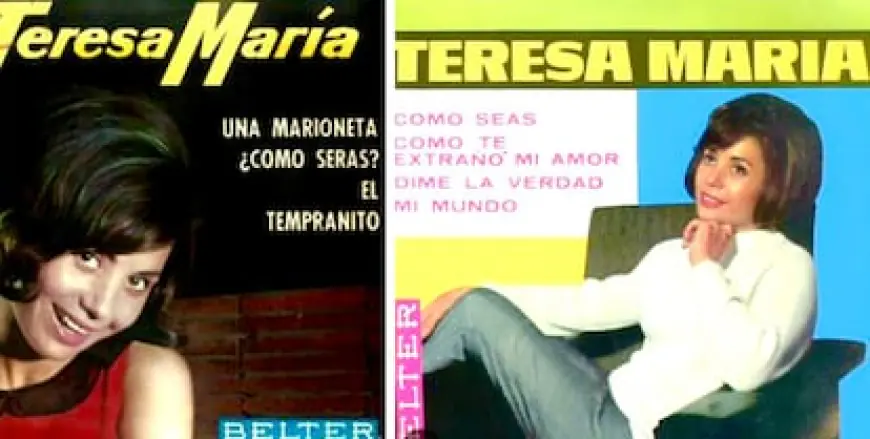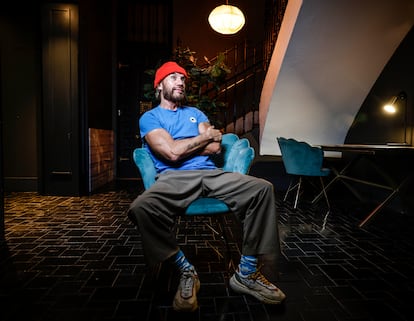The haze of Alzheimer’s by María Teresa Heras, voice of Mary Poppins and mother of the musician Macaco | Culture
One day María Teresa Heras started losing her keys and forgetting things at home, but no one gave it much importance: it’s normal as you get older. His memory losses didn’t seem too worrying. “We are in a world in which there is a lot of noise, a lot of immediacy, it seems that there […] The post The haze of Alzheimer’s by María Teresa Heras, voice of Mary Poppins and mother of the musician Macaco | Culture appeared first on The USA Print.

One day María Teresa Heras started losing her keys and forgetting things at home, but no one gave it much importance: it’s normal as you get older. His memory losses didn’t seem too worrying. “We are in a world in which there is a lot of noise, a lot of immediacy, it seems that there is no time to stop, to look at each other, to listen to each other,” says his son Daniel Carbonell Heras. Then the situation began to get serious: Heras left the fire on, for example, and some of those mistakes began to be noticeable and dangerous, and stand out against the surrounding noise. The family’s suspicions began to turn towards the disease with a fearsome name. And the tests confirmed the worst: Alzheimer’s.
This mother and this son are very particular. María Teresa Heras, now in her eighties, dubbing actress, pianist, singer, is etched in the memory of several generations, although those generations do not recognize her by her name, but by her voice. With her soprano register, with a lightness as if singing cost nothing, it was the dubbing voice of Julie Andrews, that is, the one that resonates inside our skull singing that of “Do is a man’s treatment…” in smiles and tears or that other thing about “With a little sugar, that pill they give you…” in Mary Poppins. Another of his most remembered works is the dubbing of Audrey Hepburn in My Fair Lady.
His son, Daniel Carbonell Heras, 52, is the famous musician Macaco, who mixes a multitude of warm and danceable styles in his cocktail shaker and who, by the way, was inspired for his stage name by the nickname his mother gave him, Monkeyfor that childhood hobby of climbing everything climbable. “I went to school and said that my mother was Mary Poppins… and they slapped me in the face, of course,” Macaco recalls with amusement. By the way, at the age of 13, young Daniel already participated in the dubbing of The Gooniesalthough he did not continue down that path.
A woman ahead of her time
Born in Garrapinillos (Zaragoza), Heras had grown up in a humble, peasant family, although with cultural interests: his grandfather had made his first steps in poetry, especially of a social nature. Heras chose the path of music, first destined for beautiful songlater dedicated to popular music. “My mother had to fight a lot to develop her piano and singing career, she was ahead of her time: a woman being a singer was not well regarded by the recalcitrant machismo of the time,” says Macaco. “She is a self-made woman,” he adds.
In addition to her famous dubbing, she also attempted a solo career under a stage name that altered the order of the factors of her real name: from María Teresa it became Teresa María. He recorded some albums in the 60s, the time of yeyé, where there were songs like a puppet, whatever you are either Tell me the truth. He frequently appeared on television and was about to represent Spain at Eurovision in Copenhagen.
“His career generated interest and, after the films, he received offers to go to the United States and implement a strategy to launch it worldwide,” explains his son. But the pregnancies just arrived and, like so many mothers, she sacrificed her budding career to take care of her two children (and their cousin, who was always like another brother). In some interviews, Heras has been surprised that his dubbing has had more impact over time than at the time: he ended up receiving tributes on the anniversaries of his films.
“In my house, in the Gràcia neighborhood of Barcelona, there would be nothing else, but there were all kinds of records. They taught us eclecticism, that in all genres there is good and bad music,” says Macaco. His father was also a musician, a jazz drummer, and had a program about those sinuous rhythms on Radio Barcelona. In that breeding ground it was not strange that young Daniel began to make his first steps and form hardcore, punk, and hip hop bands, until he achieved great success. “My mother, in addition to being very loving, has always been punki-sincerelike my aunt: they have always told me what they really thought about my songs, for better and for worse… and that helped me a lot,” he explains.
Now Macaco releases an exciting song about his mother and the disease, The memory of the heartin collaboration with the Alzheimer’s Foundation Spain. Thanks to technology, mother and son sing together: fragments of Heras appear within Macaco’s song, with that sound retrosinging My Fair Lady. “With this song I want to encourage families of patients with Alzheimer’s to search through the drawers that are out there linked to very deep emotions, and to find points of connection, which could be music, or any other hobby,” says Macaco. One of the most emotional verses perfectly illustrates this idea: “Keep your feelings mom / I will keep the memories / only your memory is asleep, mom, / your heart is still wide awake.”
“We should have reacted sooner, because prevention is very important: Alzheimer’s has no cure, but if it is detected early it is possible to extend life,” says Macaco. At home they detected three phases. The first, in which the disease reared its ugly head with small oversights. The second, in which the memory loss was already very evident, and generated problems. It is that moment in which the patient has to deal with the new situation, he becomes aware that something is happening, and that something can be serious. Furthermore, Heras was rapidly losing his hearing, a great setback for someone transfixed by music.
“It was a very hard phase, because my mother needed help at home and refused to receive it. She had always been a very good-natured, very positive woman, but then her character turned sour when she fought the disease,” explains the musician. That was when Alzheimer’s appeared in medical diagnostic images, that strange word that, curiously, they always tried to avoid, and that in the song Macaco describes as “that man with an unnameable last name.” Uncertainty, anxiety, sadness: there began a precipitous fall that took him to a third phase, in which he now remains.

“Fortunately it is a phase of peace,” says his son. He describes it as an abstract and surreal world where loops abound and where, sometimes, there is even room for comedy, given the unexpected mixtures between past, present and future. “My mother still recognizes us perfectly, and there are situations of great love,” says the musician. There are also other ways of communicating: one day while chatting in the garden, Macaco started singing one of his mother’s songs: she turned around, as if reconnected from another dimension, and started singing with him. Connections that, despite the sick brain, remain. “Sometimes, you have a bad day, you are sad or upset, and she looks at you and asks you what’s wrong,” says the musician.
Heras explores these worlds in a residence where he is given all the care. Before finding her, the family was able to see the degeneration and neglect found in many of these institutions, which every so often drips into scandalous press reports: the shame of a society that does not know how to treat the generations that are leaving. “We have to pamper the nursing homes, if not for them, at least because we are going to end up there,” says the musician.
The literary news analyzed by the best critics in our weekly newsletter
receive itBabelia
The post The haze of Alzheimer’s by María Teresa Heras, voice of Mary Poppins and mother of the musician Macaco | Culture appeared first on The USA Print.
What's Your Reaction?









































































































